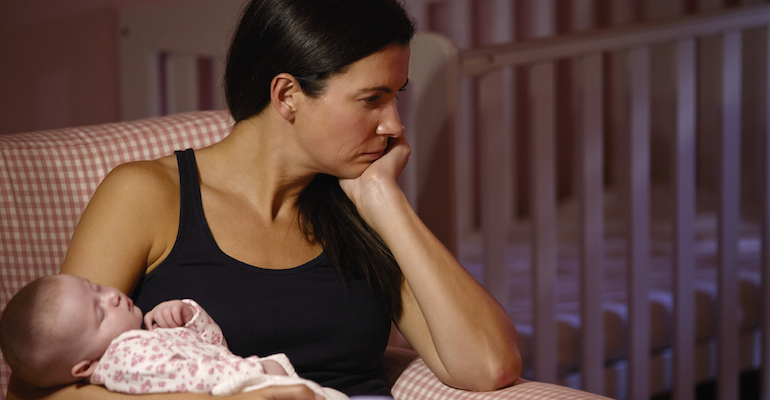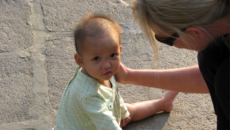The adoption process led you to the joyous moment of meeting your child, but it absolutely did not include preparation for the overwhelming feeling of “baby shock” that all new adoptive parents experience to some degree. Day-to-day life with a new child, who is scared and perhaps angry or rejecting (and who has apparently lost the ability to sleep at night), can make even the most self-confident parent lose that perky edge.
What you are experiencing is natural. Though the rewards and joys of parenting are huge, the challenges can be draining, confusing, and…depressing.
Loss is a catalyst for depression. Post-Adoption Depression (PAD) is a response to new experiences and to losses — from feelings of let-down, to the hard work of meeting an adopted baby’s special needs, to the physical and emotional strain of not being prepared for any of the above.
Many of the suggestions recommended to lessen a child’s trauma as she transitions to her new family could actually contribute to your feelings of isolation and depression. Allowing yourself to seek support and communication with other adults is vital to your emotional health. Modify how you think about your new family, and enlist your friends and relatives. Plan to:
1. Let others do the work.
Instead of overwhelming your new child with a large celebration when you bring her home, have a smaller party when your baby is more secure. Let others do the work of entertaining so you can remain totally available to your child while visitors are there. Let friends and family know in advance that you are not allowing others to hold/care for your baby until she is securely attached to you. A letter to loved ones explaining attachment needs and thanking them for their love and support is an enlightening, team-building tool.
2. Take care of you.
When you are tired: nap, take the phone off the hook, and don’t answer the door. Cancel your newspaper subscriptions (or read only the front page for a while). Don’t feel guilty about cutting back on activities like volunteering. If you are in a position to do so, quit your job or work part-time, if that is what you want to do.
3. Take control of visitors.
Limit them to one or two at a time, and schedule them at your convenience. If you need adult interaction, pick up the phone and ask a friend to come visit — and pick up some take-out on the way.
4. Strategize.
If you have a partner, discuss who is going to do which duties and when. Review your agreements and allow for change. Talk about fatigue and about taking care of each other. Discuss sex, and communicate your interest or disinterest in a loving fashion. Stress, depression, and a high-needs baby can strain any relationship. If you can afford it, hire housecleaning or yard help. Simplify your life so you can devote your attention to your family.
5. Shift your focus.
Include your baby in all your outings. Accept only those invitations that welcome your new child. This won’t last forever, and it’s important to your family now. Remain flexible to avoid disappointment and irritation. (As one wise dad put it, Rule #1 of parenting is: Your Plans Don’t Matter!)
6. Give yourself a break.
If you are adopting an older child, professionals advise to homeschool him for about six months to construct a parent-child relationship. Connect with other local homeschooler parents for advice, resource-pooling and social interaction. Expect some challenges and be prepared to enlist support — clue playgroup moms into behaviors you are working on, and how they can help. Find a translator. See an attachment therapist to aid transition. Make a plan that includes respite care; everyone needs to recharge.
7. Play, play, play.
Enroll in a parent-child class like Gymboree or Kindermusik. Active play will help lower frustration levels for both of you, and conversation with other adults on a regular basis is a necessity.
Sometimes an attitude shift is all it takes to make a difficult situation manageable, but sometimes post-adoption depression requires outside help. Finding innovative ways to meet your own needs, while giving precedence to your child’s, is a day-to-day balancing act that requires thought and action. Being aware of PAD (and seeking help quickly) will mitigate the effect that baby shock can have on you, and will give you the freedom to enjoy the child you’ve forever dreamed of parenting.


